When one reads that casino revenues were up in, say, Indiana, despite lower foot traffic, you’ve got to wonder how its done. Applied Analysis has the answer: Slot holds are at “all-time highs,” meaning that some of the economic recovery we’ve been seeing is artificially 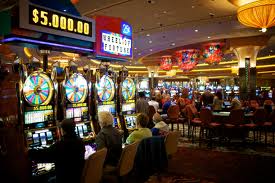 generated. The study was commissioned by the Association of Gaming Equipment Manufacturers, who are to be commended for essentially blowing the whistle on themselves. Except for Florida‘s drop from 9.5% to 6% hold, most states have seen 6% increases in hold since 2007, even as actual slot play fell by double-digit amounts.
generated. The study was commissioned by the Association of Gaming Equipment Manufacturers, who are to be commended for essentially blowing the whistle on themselves. Except for Florida‘s drop from 9.5% to 6% hold, most states have seen 6% increases in hold since 2007, even as actual slot play fell by double-digit amounts.
Applied Analysis takes issue with Wall Street pundits on the subject of recent comebacks, saying, “a rising hold percentage has not translated into incremental gaming revenue for operators during the post-recession era. In fact, they very 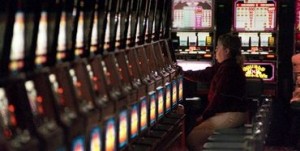 well may be contributing to its decline.” Besides, blowing through a player’s budget faster diminishes that Holy Grail of slot play, time on device. Casino expert Frank Legato describes slot floors as being in “an unprecedented funk,” though he doesn’t place the blame just on holds, though he does cite a Buckingham Research Group study that came to the same conclusion Applied Analysis did.
well may be contributing to its decline.” Besides, blowing through a player’s budget faster diminishes that Holy Grail of slot play, time on device. Casino expert Frank Legato describes slot floors as being in “an unprecedented funk,” though he doesn’t place the blame just on holds, though he does cite a Buckingham Research Group study that came to the same conclusion Applied Analysis did.
According to a Caesars Entertainment boffin, “we’re looking for an entertainment experience for the guest that will allow them to have the right play experience and allow us to meet our budgeted numbers. It’s a balancing act …”
The Buckingham report says the slot industry is suffering from a depressed replacement cycle and a cutback on participation games (as when Caesars conducted a purge of Wheel of Fortune machines). 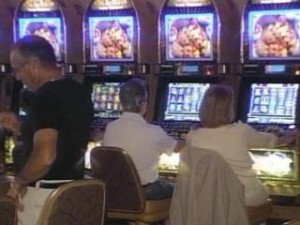 Increased game speeds and tight penny slots were also held to blame. “The net effect is that it doesn’t matter what anyone says or does—if you have a higher-hold game, the player will lose quicker,” WMS design chief Allon Englman told Legato, ““And eventually, you will notice it. You may not notice it from one game to another, but you’ll notice it if you have to drive an hour to a casino and you play 30 percent less over the course of a year.”
Increased game speeds and tight penny slots were also held to blame. “The net effect is that it doesn’t matter what anyone says or does—if you have a higher-hold game, the player will lose quicker,” WMS design chief Allon Englman told Legato, ““And eventually, you will notice it. You may not notice it from one game to another, but you’ll notice it if you have to drive an hour to a casino and you play 30 percent less over the course of a year.”
Legato’s own conclusion was that slots faced “a perfect storm of changing game style, faster play, increasing minimum wagers, free 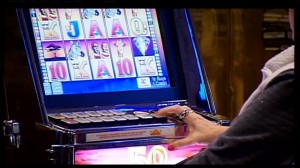 play replacing cash coupons and yes, the economy.” The rise of social gaming in lieu of slot play was also noted. The rise of free play as a marketing incentive tightened the screws on slot-floor managers still further, as they had to compensate for those promotional allowances. And with machines having gone from eight spins a minute to 17, the tighter-slot effect is bound to be felt sooner and more sharply. However, monthly casino revenue reports from the field suggest that (with the notable exception of Atlantic City), consumers don’t mind.
play replacing cash coupons and yes, the economy.” The rise of social gaming in lieu of slot play was also noted. The rise of free play as a marketing incentive tightened the screws on slot-floor managers still further, as they had to compensate for those promotional allowances. And with machines having gone from eight spins a minute to 17, the tighter-slot effect is bound to be felt sooner and more sharply. However, monthly casino revenue reports from the field suggest that (with the notable exception of Atlantic City), consumers don’t mind.
* The Las Vegas Club went out with a whimper last night. One player told Vegas Inc. that “The employees here made the place. The more time went on, the more appreciative they were of the people who still came here,” perhaps because there were so few of them. New owner Derek Stevens is taking his time to evaluate his options for the building, which will no longer be called the Vegas Club, and — with his own Golden Gate casino directly across the street, he may well not want to go into competition with himself.
* On a happier note, Horseshoe Baltimore celebrated its first anniversary, a tumultuous period that saw the casino briefly closed due to race riots in downtown Baltimore (though not as strange a spectacle as the Florida Marlins Baltimore Orioles playing a game before a completely 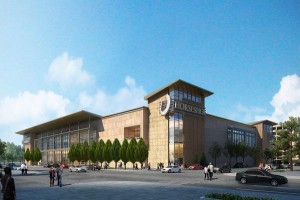 empty stadium). It’s been a rough first year, one that saw fistfights in the casino, that weeklong curfew and a three-month recovery period. However, Horseshoe is to be commended for continuing to pay employees while the casino
empty stadium). It’s been a rough first year, one that saw fistfights in the casino, that weeklong curfew and a three-month recovery period. However, Horseshoe is to be commended for continuing to pay employees while the casino-hotel was closed and for not using Baltimore’s troubles as an excuse to sack employees en masse. There has been some deflation of the workforce since Horseshoe Baltimore opened, but new casinos always over-hire at the beginning and weed out the superfluous employees as business stabilizes. Were Horseshoe to live up to its projections, it would have to lay on more workers, which is a nice thought for the day.
* The transition of the Tropicana Las Vegas to Penn National Gaming is a done deal. Penn CEO Tom Wilmott told the Nevada Gaming Commission that “many of our customers come to Las Vegas today and are staying at our competitors.” So Step One will be to install Penn’s loyalty program. Although all the Trop rooms were refreshed five years back, Penn is promising additional upgrades over the long term.


FYI the Horseshoe Baltimore doesn’t have a hotel. There’s one directly next to it, but that’s not part of the hotel. Also, it was the White Sox in town for the empty game against the O’s.
Time to take my ginko biloba, obviously.
*thumbs up*
FWIW outside of the door from the casino to the main parking landing and the slightly small escalators it’s a pretty well laid out place. I didn’t think 2 levels would work, but it’s actually kinda neat.
I went to the Horseshoe Baltimore for the first time last week. I can’t emphasize enough how wierd the location is or just how little management does to promote the place. It is within walking distance of both the football and baseball stadiums but one must traverse about four blocks of mostly abandoned factories to get there. They don’t advertise at either of the stadiums. There are billboards promoting Maryland Live everywhere. That said, it’s a nice facility and I walked out winning maybe $10 but it’s entirely oriented toward automobile traffic in a city with a lot of pedestrians and tourists, at least during non-riot periods.
My favorite quote ever:
According to a Caesars Entertainment boffin, “we’re looking for an entertainment experience for the guest that will allow them to have the right play experience and allow us to meet our budgeted numbers. It’s a balancing act …”